Prayer for the Living Read online
Page 9
No tea or cakes were served afterwards. Those of us who were visitors found ourselves on the gravel of the forecourt, near the fading wisteria, blinking in the surprise of sunlight, like owls.
Without a word, we went our different ways into the branching streets of Hampstead.
4
One beautiful Sunday, six months later, I was wandering about on Hampstead Heath with a friend. She was a painter and like me was given to metaphysical speculation. I had confided to her the unlikely story of the mirror.
We stood on the brow of the hill. The sweep of the sky made us thoughtful. Far off could be seen the Houses of Parliament. Children were rolling down the hill.
As we gazed at the city, my friend said:
‘The reality of the world is more incredible than we are taught.’
Then she wandered off to find motifs for the day’s painting.
I stood staring at the magnificence of the world. After a while I made my way down the hill and sat on a bench by the lake. I watched the changing colours of the sky on the face of the water.
The bench was empty when I sat down. I hadn’t been there long when someone sat on the bench next to me. The intrusion irritated me, but after a moment I suddenly experienced a sense of peace.
I didn’t look to see who it was, but went on staring at the surface of the lake, and made the not surprising discovery that the lake was also a mirror. Gazing at its reflections, lost in a serene mood, I was transported.
‘All things incline to our liberation, if we know how to use them,’ said a voice from the lake, jolting me back to the present.
The air about me changed. There was no one around. The man who sat next to me was gone.
The shadow of a heron flew low over the grey-blue waters.
The Standeruppers
For some time we had seen them trying to crouch. We had seen them reaching for something in the air that was not there.
From the sky a god was wetting the earth with the vigour of their water. Another god was growling. The earth was answering. We were dancing in the water of the gods.
It was a good day. We had followed the beast across the grass. We had followed it morning and night. Someone had brought an image of the beast in the chants they made and we saw the beasts in our heads as if they were right there. We ran with our four legs when we chased the beasts across the grass. We had sharp stones to stab them with. We dreamed of them all night in the cave.
When blackness comes we wait to see what the god of night will do with our sleep. Then we go to the place where we can do anything. There are many other beings there that we do not know. We watch them all night. When the light-god returns, the other place goes with our getting up.
2
The best among us were the crouchers. We crouched in the round light of the light-god. Those on four legs moved fast but low. The tall grass moved when they moved but you could not see them.
We ran across the dust. I saw one moving on three legs. We thought it odd. We growled at him later as we tore the flesh of the beast with our teeth. He growled back with an odd face. As if he knew something. We thought of killing him.
So fast it all changed. No one knows how. Many times the blackness came. The round white in the sky moved over the grass. Many things we saw on the other side of the dark where the shadow people live.
3
Then someone showed us something not there before in the cave. We saw the beasts on the cave walls. We tried to kill them but they would not die. Much redness came from us in that battle with the wall. Then we saw one laughing. Watching us and laughing as we fought beasts on the cave wall.
We thought we were on the other side of the dark where we went when we closed our eyes. But the beast was there on that wall. The other one was laughing as our sticks broke against the beasts that would not move on the wall. They were not beasts you could touch or eat. Made of rock. They made us hungry.
When the light-god came back and we could see we went to find the beasts in the grass. We knew how to fight them now that they were made of stone.
4
The one who laughed did not come with us. Something was strange about him. We crouchers had to look up at him, with the light-god in our eyes. As we went we thought of killing him. But his laughter filled us with fear.
The beast was easier to kill now that we had fought it on the wall. We feared it less.
So many noises we made. With our sharp stones we waited. When it ran at us we crouchers were ready. We jumped on its back.
But one who was not crouching found a way to hold its neck. Then its blood wet the earth. With our voices raised, we bore it home.
5
The one who laughed looked strange when we got back. He was as if risen. He began it all. The stretching, the reaching. Afterwards the crouchers grew fewer. At first we wanted to kill those that did not crouch anymore, those that on two legs balanced.
Hard to be like them.
It took me many darknesses to walk with three feet, to stand on two legs.
Hair filled my face.
Those who did not crouch, who stood up, became leaders of the cave. One of them put the beasts on the cave walls in secret. He had the power of the gods. A woman worked with him. Both their eyes were dark.
6
They were the first standeruppers. We did not know what to do with them. But because of them it was easier to have meat between our teeth and grass under our heads.
Changing too fast. With the beasts and the cave walls and not crouching anymore, changing too fast.
I liked it best when the light-god rose over the grass.
Alternative Realities Are True
‘How wonderful that we have met with a paradox. Now we have some hope of making progress.’
NIELS BOHR
He woke one morning into a strange universe. Everything in his one bedroom flat in Kensal Rise was exactly the same, but everything was also subtly different. He was not sure how.
There was a message for him on the answer machine which he listened to with the irritation the acute heat brought him. He hadn’t been able to sleep. He’d been puzzling over his latest case. With each new piece of information he was finding it more troubling.
The message was from the office, delivered in a verbal encryption which he simultaneously deciphered. The dead man had been seen in the café at the canal. He looked through the crack in his curtains. It was nearly dawn. In his garden the blackbirds whistled their morning chorus. Usually, when he heard them he knew that sleep was over for him. This morning, there was something different about their tone.
Detective Draper got out of bed and slipped on his dressing gown and went to his study to review the case. On the face of it, the case was simple.
There had been a murder near him in Kensal Rise, but the body of the victim had not been found. There was no actual proof of murder, but there was knowledge of it. A young overwrought Muslim woman in a blue headdress who gave her name as Ana had come into the local police station. She had broken down and said a man she knew had been murdered. She gave his name. When asked how she knew he had been murdered, her eyes widened and she threw up her hands. She knew, she said. Who was the murdered man, who was he to her, she was asked.
But she would not say. Who was the killer, she was asked. At this she panicked and fled from the station. A few enquiries led them to her address and a watch was placed on the building.
A man by the name of Barrett, the assistant of a famous artist, went missing that same day. He had been known to frequent the woman’s flat. This was a month ago. Barrett had still not been found.
Detective Draper, who believed more than anything that intuition was superior to intellectual deduction, opposing himself to the theatrical methods of Sherlock Holmes, which had so captivated the police force, Scotland Yard, and the general public, knew that he was dealing with a case that amounted to more than the appearance of the facts. He believed that it was indeed essential to study a case thoroughly, to
acquaint oneself with the locale of the crime, to handle the items of the principal players, in short to furnish the senses and instinct with all the available data and living facts possible and then, like a fisherman who must commit himself to the sea, he must leave all those facts behind and trust to the mysterious dictates of intuition.
He had developed the faculty of intuition as a young man when he trained himself to be able to tell which side a coin would fall, just by following the clearest whisper in his head. By slow degrees, applying this method to phone calls, knocks on doors, letters that he had received, guessing their contents and who sent them before opening them for verification, he had come to develop this mysterious faculty to a formidable degree.
Detective Draper never spoke about this to anybody, knowing full well that he would be a laughing stock if he did. He masked his secret technique behind a tremendous amount of paperwork and planning and detailed analyses. To all accounts, from the outside, he was an eminently practical detective, who did his research, and left nothing to chance. In truth he believed in the fertility of chance itself, which he did not regard as chance at all. He believed that all things in the universe were linked and that every fact was related to every other. From his armchair he solved his cases by indirection. He was the best in the force, his reputation unmatched.
That morning in his study, he went over the case methodically. He realised that there was something wrong with the facts of the case, some slight alteration of the world. For example, as soon as they put a watch on the Muslim woman’s house certain other facts of the case shifted.
This was puzzling. The watch reported that, through the window, he had seen Ana’s neighbour – a man named Jorg – cutting up a large chicken. The moment he noticed the chicken being cut up the lights in Ana’s room had come on. Here was where it became baffling. The watch swore that he saw Jorg both cutting up the chicken and going into Ana’s room at the same time. The watch was a sober man of unimpeachable reputation.
There were several other curious anomalies. Another, taken at random, was that when Jorg was seen cutting up the large chicken in his room, the reported victim of the murder was seen by witnesses in a café on the canal a few miles down the road. Those who saw him said that he looked well, if a bit anxious, and that he was reading a book at the time. Most of the witnesses could not recall the title of the book. Detective Draper did not think this at all unusual. Most people, he found, did not notice what was right under their noses. The inattentiveness of people was a constant source of amusement to him. He had come to rely on their failure to notice things. His best deductions came from working round the bends of this failure.
Questioning one of the witnesses he was able, through indirection, to work out the title of the book. To any other detective such a detail as the title of a book a victim was reading would be insignificant. But to Detective Draper nothing in the universe was insignificant. The witness remembered that in fact the victim was reading a cat.
‘What do you mean he was reading a cat?’
‘He was reading a cat.’
‘Did he have an actual cat in his hand?’
‘Both hands.’
‘What colour was the cat?’
‘It did not have a colour.’
‘Did it have a name?’
The last question had come to Detective Draper purely by intuition. It had simply dropped into his mind like that. But behind the intuition, hovering like the ghost of knowledge, was the understanding that some people see words as real things and that they are incapable of the abstract faculty of reading, transferring everything they read that has an image straightaway into its physical equivalent. This was one of those anomalous facts that the detective stored away in his mind.
‘Yes, it did have a name.’
‘What was it?’
‘It was a very strange name.’
‘Before you tell me what it was, tell me how you knew.’
‘It’s strange, but I just did. I looked at the cat he was reading and its name popped into my head just like that.’
‘There is no need to tell me the name of the cat,’ the detective said, nonchalantly.
‘Why not?’
‘I know it already. But, thank you.’
The detective rose to signify the end of the interview, leaving the witness quite baffled. Detective Draper, absent-minded the moment he was consumed by a clue, called several bookshops. In a short time he found out what he wanted. A copy of the book had been purchased that day, quite early in the morning, from Any Amount of Books on the Charing Cross Road. It was the only copy of the book purchased that morning. A check confirmed that the book had been bought by Jorg, as the detective had suspected. Another call to the local police station confirmed something else, that the victim had not been seen since. As it stood, there were two sightings. One was of the suspected killer in two places at the same time. The other was of the victim, after he had gone missing and was presumed dead.
For the rest of that day, contradictory reports kept pouring in. A warrant for the arrest of Jorg led to his detention. The large chicken he had been seen cutting up was brought in as evidence. But that same evening Jorg, who was in police custody, was seen in Ana’s room. He was shouting at her and at one point called her a whore.
‘I have killed that lover of yours and there’s nothing anyone can do about it.’
‘What have you done to him?’ she cried.
‘I have hidden him where no one will ever be able to find him.’
She was heard wailing, and Jorg was seen departing from the room. The watch was unable to do anything because he had conclusive proof that the murder suspect was in police custody. He had no legal right to arrest the same person twice.
Detective Draper considered the arrest of Jorg to have been an act of sublime stupidity by the local police.
The detective called in at the local station. The sergeant on duty, a thickset man, was reading Maigret. His name was Pillock and he had a reputation for brusqueness.
‘The way I see it, Detective,’ he said, ‘is that we know a crime has been committed. But we have no evidence. We suspect it’s a murder, but there is no body. And he could be a potential terrorist. We have to keep him locked up for the public good.’
The detective contemplated Sergeant Pillock. There was no use arguing with him. Explanation was equally futile. He would have to add the heavy-footedness of the sergeant into the equation.
‘But you do see that the problem multiplies?’
‘I see that it simplifies.’
‘Any new evidence?’
‘Only CCTV footage on a bus.’
‘What number?’
‘Six. Is that significant?’
‘Everything is significant. What did the footage yield?’
‘Something puzzling.’
‘What?’
‘The suspect made several trips in one direction with black plastic bags. He appeared to be moving house. We never saw him get off.’
‘Anything else?’
‘Yes, but it doesn’t make sense.’
‘Tell me.’
‘It stretches credibility.’
‘Let’s have it.’
‘On one of the cameras we caught an image of the bus just as it exploded.’
‘Did it explode?’
‘That’s just it. It didn’t. We believe the CCTV system has been hacked and false footage has been planted there.’
‘Unless there is an equally radical solution. But I fear we may be too late. We have to act fast.’
‘What shall we do?’
The detective did a rapid calculation. He felt himself encircled by time.
The first thing he did was order that the watch be pulled off Ana’s house. Then he suggested that the suspect be released and not followed.
‘Not followed?’
‘No.’
‘But he must be followed.’
‘It will only make things worse.’
‘How?’
‘What was that?’
‘Nothing. Forget it.’
‘Are you on something?’
‘No, I’m sober as a surgeon on duty.’
‘Then you need to fill me in.’
Detective Draper knew he could not explain the intuition that was filtering through to him. Wearily, he sought the most innocuous expression of it. He softened his voice as he spoke.
‘Everything we do influences what the suspect does. We are multiplying the problem. Before there was one murderer, now there are three.’
‘Three? Which three?’
‘Free,’ the detective corrected himself. ‘I meant he should be free.’
2
Detective Draper knew there were only two ways to resolve the case. One was to prevent the murder, the other was to uncover it. All the evidence suggested it was too late to prevent the murder. It had happened. That past had now been lost. If the victim had been apprehended when he was seen reading the cat, things might have been different. That moment was gone. It was lost because no one noticed that the past lurks in the present. Not just past events, but the past as present.
Detective Draper liked to walk after he had been immersed in facts too long. When he had spent all day reading documents, studying evidence, listening to witnesses, when he was saturated with too much information, he would walk in a zigzag path through side streets to his home. Anyone seeing him would think he was wandering aimlessly. But his walks always followed the pattern of his thoughts. He had always known that the indirect route led more quickly to his destination. The direct routes were often bogged down in interruptions, conversations, and crowded streets.

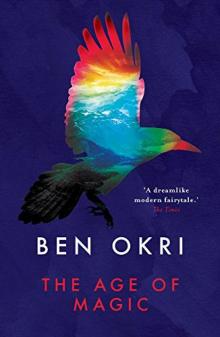 The Age of Magic
The Age of Magic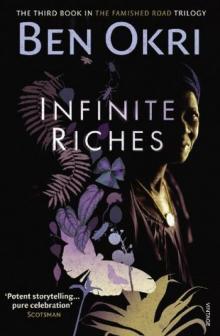 Infinite Riches
Infinite Riches Songs of Enchantment
Songs of Enchantment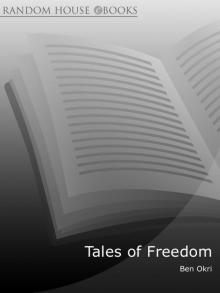 Tales of Freedom
Tales of Freedom Dangerous Love
Dangerous Love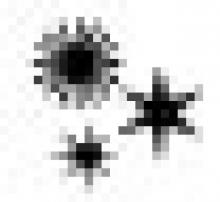 Starbook
Starbook The Famished Road
The Famished Road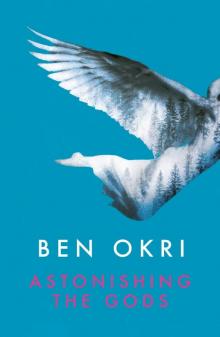 Astonishing the Gods
Astonishing the Gods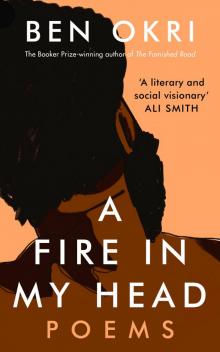 A Fire in My Head
A Fire in My Head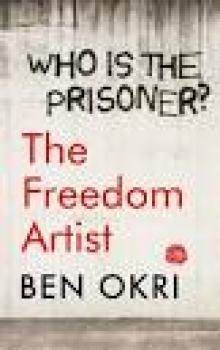 The Freedom Artist
The Freedom Artist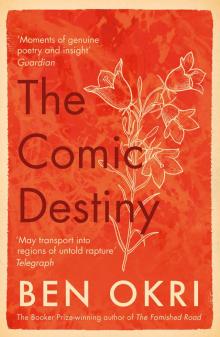 The Comic Destiny
The Comic Destiny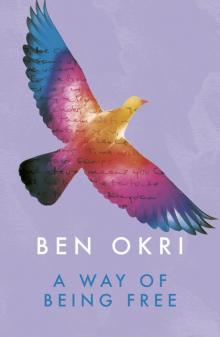 A Way of Being Free
A Way of Being Free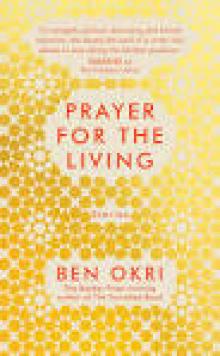 Prayer for the Living
Prayer for the Living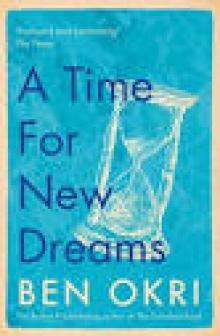 A Time for New Dreams
A Time for New Dreams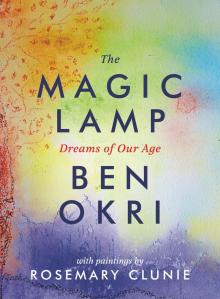 The Magic Lamp
The Magic Lamp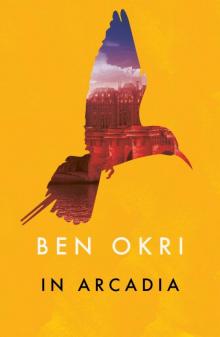 In Arcadia
In Arcadia